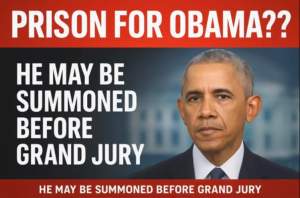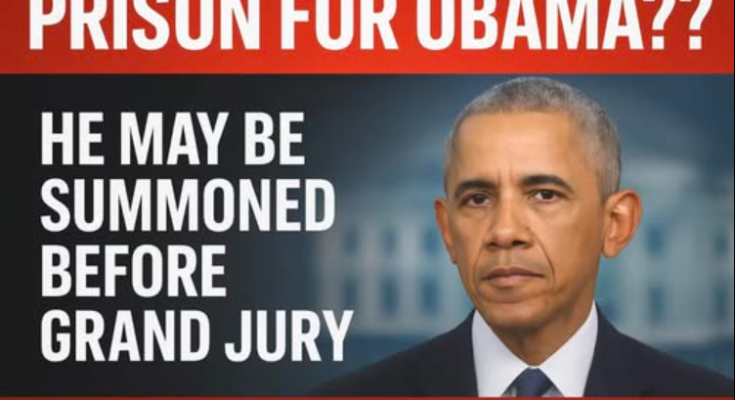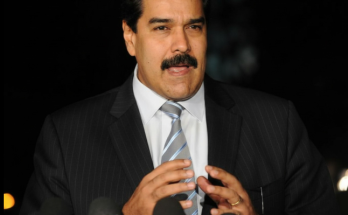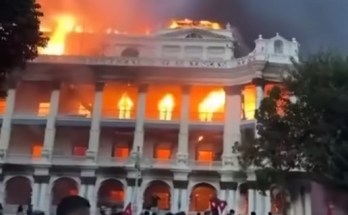
The political landscape in the United States has been rocked by a dramatic development: former President Barack Obama and several top officials from his administration may now face a grand jury investigation over renewed allegations tied to the long-running “Russiagate” saga. The move, announced in early August 2025 by Attorney General Pam Bondi, has reignited fierce debate over the origins of the 2016 Russia investigation and the role of intelligence agencies under the Obama administration.
Let’s unpack the details, the players, and the implications of this unfolding story.
⚖️ The Grand Jury Order: A Legal Earthquake
Attorney General Pam Bondi directed federal prosecutors to convene a grand jury to investigate claims that Obama-era officials “manufactured intelligence” about Russia’s interference in the 2016 presidential election. This decision followed a referral from Director of National Intelligence Tulsi Gabbard, who declassified documents she claims undermine the original conclusions about Russia’s intent to help Donald Trump defeat Hillary Clinton.
The grand jury now has the authority to issue subpoenas, compel testimony, and potentially recommend indictments. While no charges have been filed, the legal machinery is in motion, and the implications are enormous.
🧠 The Allegations: A “Conspiracy” or Political Theater?
At the heart of the investigation is the claim that Obama administration officials doctored intelligence assessments to falsely implicate Trump in collusion with Russia. Gabbard’s memo alleges a “treasonous conspiracy” to weaponize the intelligence community against Trump.
Critics argue that these claims are politically motivated and lack substantive evidence. CNN reported that the declassified documents do not alter the core findings of the U.S. intelligence community—that Russia launched a campaign of influence and hacking aimed at undermining Clinton’s candidacy.
Still, Bondi’s decision to pursue the matter legally has given the allegations new life, and the grand jury probe could unearth previously undisclosed details.
👤 Who’s in the Crosshairs?
While Obama himself is not officially charged, the investigation could implicate several high-ranking officials from his administration, including:
- James Clapper – Former Director of National Intelligence
- John Brennan – Former CIA Director
- Susan Rice – Former National Security Advisor
- Loretta Lynch – Former Attorney General
These individuals were central to the intelligence assessments and legal decisions surrounding the Russia investigation. If the grand jury finds credible evidence of wrongdoing, they could face subpoenas or even criminal charges.
🔍 The Role of Tulsi Gabbard
Tulsi Gabbard, once a Democratic congresswoman and now serving as Director of National Intelligence under President Trump, has emerged as a key figure in this saga. Her decision to declassify documents and publicly accuse the Obama administration of misconduct has drawn both praise and condemnation.
Gabbard insists that her actions are about transparency and accountability. “The American people deserve to know whether their intelligence agencies were used as political weapons,” she said at a White House press briefing.
Democrats, however, have dismissed her claims as part of a broader effort by Trump allies to rewrite history and distract from current controversies.
🗂️ What the Documents Say
The declassified materials include internal memos, email chains, and draft intelligence assessments from 2016. Gabbard argues that these documents show inconsistencies in how the intelligence community evaluated Russia’s intentions.
One key point of contention is whether Russia’s goal was to help Trump win or simply to sow chaos. Gabbard claims the latter, suggesting that the Obama administration exaggerated the threat to justify surveillance and political attacks.
However, multiple reviews—including the bipartisan Senate Intelligence Committee report and the Mueller investigation—have upheld the conclusion that Russia sought to aid Trump’s campaign.
🧨 Political Fallout
The announcement of the grand jury probe has triggered a political firestorm:
- Republicans have hailed the move as long-overdue accountability for what they see as a politically motivated smear campaign against Trump.
- Democrats have called it a “fishing expedition” designed to distract from Trump’s own legal troubles and to intimidate political opponents.
Former President Trump celebrated the news on Truth Social, writing, “The TRUTH always wins out. This is great news”. Meanwhile, Obama’s spokesperson dismissed the allegations as “bizarre” and “a weak attempt at distraction”.
🧭 Legal vs. Political Strategy
Legal experts caution that convening a grand jury does not guarantee indictments. It’s a tool for gathering evidence, and prosecutors must meet a high bar to pursue criminal charges.
Still, the optics of a former president potentially facing legal scrutiny are unprecedented. It raises questions about the politicization of justice and the long-term impact on democratic institutions.
🕰️ A Timeline of Russiagate and Its Echoes
- 2016: U.S. intelligence agencies conclude Russia interfered in the election to help Trump.
- 2017–2019: Mueller investigation finds insufficient evidence of criminal conspiracy but documents extensive Russian contacts with Trump associates.
- 2020–2022: John Durham’s probe into the origins of the Russia investigation yields limited results.
- 2025: Tulsi Gabbard declassifies new documents; Bondi orders grand jury probe.
This timeline shows how Russiagate has evolved from a counterintelligence investigation into a political saga spanning nearly a decade.
🧵 Threads of Accountability
The grand jury probe may not result in charges, but it could reshape public understanding of Russiagate. If prosecutors uncover evidence of misconduct, it could lead to reforms in how intelligence is used in political contexts.
Alternatively, if the probe fizzles, it may reinforce concerns about the weaponization of justice for partisan gain.
💬 Public Reaction
Public opinion is sharply divided. Some view the probe as a necessary reckoning, while others see it as a dangerous precedent. Polls show that trust in government institutions remains low, and events like this only deepen the divide.
Media coverage has been intense, with outlets across the spectrum offering competing narratives. The Independent described the probe as part of Trump’s “revenge plot” against Obama, while Fox News framed it as a breakthrough in exposing corruption.
🔮 What Comes Next?
The grand jury will likely operate for several months, reviewing evidence and hearing testimony. Prosecutors could issue subpoenas to former officials, and any indictments would trigger a legal and political earthquake.
For now, the nation watches as one of its most revered presidents faces the possibility of legal scrutiny. Whether this leads to justice or political theater remains to be seen.
If you’d like a breakdown of the legal mechanics behind grand juries, or a deeper dive into the intelligence controversies of 2016, I can take you there. Just say the word.


